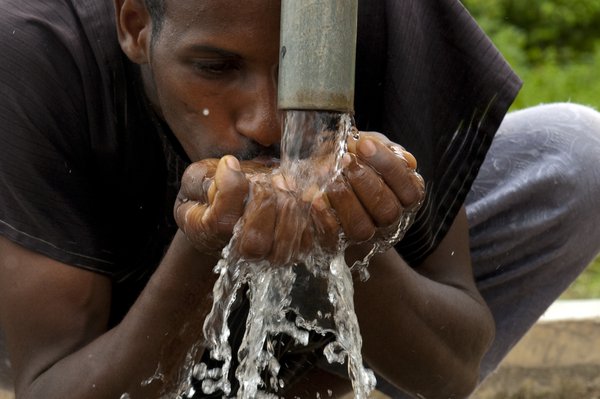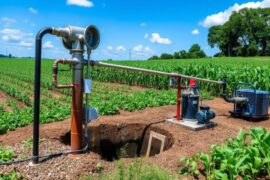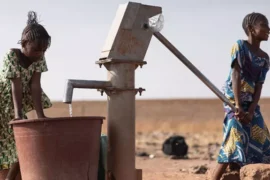Key Takeaways
- Boreholes provide consistent and cost-effective access to groundwater, crucial for sustainable water management in communities.
- Proper maintenance and monitoring prevent aquifer depletion and water quality issues, ensuring long-term sustainability.
- Strategic placement of boreholes enhances water access in underserved areas, promoting self-sufficiency and reducing transportation costs.
- Community involvement and education on sustainable usage foster responsible management of groundwater resources.
- Integrating boreholes into comprehensive water management strategies maximizes benefits while minimizing environmental impacts.
Understanding Boreholes and Their Functionality
Boreholes serve as vital conduits for accessing groundwater, making them essential for sustainable water management. Understanding borehole technology is key to optimizing groundwater extraction efficiently. You’ll find that boreholes are typically drilled to reach aquifers, where water is stored beneath the earth’s surface. The technology involves various methods, including rotary drilling and percussion drilling, each suited for different geological conditions. Once a borehole is established, a pump is installed to facilitate groundwater extraction, guaranteeing a reliable water supply. Monitoring the water level and quality is essential, as it allows you to assess the sustainability of the source. Additionally, proper maintenance and regular assessments can prevent issues like contamination and over-extraction. By leveraging advanced borehole technology, you can guarantee that groundwater remains a viable resource for your community, aligning with long-term environmental goals and addressing water scarcity challenges effectively.1 Bedroom Apartment for Rent in Accra – Updated Listings
If you’re looking for a one-bedroom apartment for rent in Accra, you’re in luck! The rental market here offers diverse options that cater to different lifestyles and budgets. Neighborhoods like Osu and East Legon feature modern amenities and a lively atmosphere. You’ll want to focus on key amenities such as
Advantages of Boreholes for Water Supply
The implementation of boreholes for water supply brings numerous advantages that greatly enhance water accessibility and management. One significant benefit is cost efficiency; once installed, boreholes require minimal maintenance and operational costs compared to traditional water supply systems. By tapping into underground aquifers, you guarantee a consistent source of water availability, reducing reliance on surface water sources that may fluctuate due to seasonal changes. Furthermore, boreholes can be strategically placed to serve communities lacking infrastructure, providing immediate access to clean water. This localized approach not only mitigates transportation costs but also promotes self-sufficiency in water management. Additionally, boreholes can support agricultural activities, contributing to improved food security. In essence, the advantages of boreholes lie in their ability to provide reliable, affordable, and sustainable water solutions tailored to specific community needs, making them a compelling option for addressing water scarcity issues.Potential Environmental Impacts of Boreholes
While boreholes offer significant advantages for water supply, their environmental impacts warrant careful consideration. One major concern is aquifer depletion. When you extract water from an aquifer faster than it can recharge, you risk diminishing this essential resource. This depletion can lead to increased salinity and reduced water quality, affecting both human and ecological health. Additionally, the drilling process itself can lead to ecological disruption. It may disturb local habitats, impacting flora and fauna. The introduction of pollutants during drilling can contaminate groundwater, posing risks to both drinking water and biodiversity. To mitigate these impacts, it’s important to implement sustainable practices. Monitoring water levels, regulating extraction rates, and using advanced drilling techniques can help preserve aquifers. You should also consider integrating boreholes with rainwater harvesting systems to enhance water availability while minimizing ecological disruption. By taking these measures, you can guarantee boreholes remain a viable water solution for the future.What Are The Best Roofing Sheets For Ghana Houses?
Looking for the best roofing sheets for houses in Ghana? Discover the pros and cons of different options, from metal to concrete and clay, in this comprehensive guide.
Challenges in Implementing Borehole Systems
Implementing borehole systems can pose several challenges that require careful planning and execution. One major hurdle is the cost implications associated with drilling, equipment, and maintenance. You need to budget effectively, as initial expenses can be high, and ongoing costs may arise from repairs or regulatory compliance. Additionally, technical expertise is vital for the successful installation and operation of boreholes. Without skilled professionals, you risk poor water quality, inefficient systems, or even environmental damage. It’s important to collaborate with geologists and hydrogeologists to assess site conditions accurately and guarantee sustainable yield. Moreover, regulatory hurdles can complicate the process, as permits and environmental assessments may be necessary. To navigate these challenges, consider engaging with local authorities and community stakeholders, which can also enhance project acceptance. By addressing these factors proactively, you can improve the chances of successfully implementing a borehole system that meets your water needs sustainably.Integrating Boreholes Into Comprehensive Water Management Strategies
Integrating boreholes into extensive water management strategies involves a holistic approach that maximizes the benefits of groundwater resources while addressing local needs and sustainability goals. You should prioritize borehole maintenance to guarantee operational efficiency and longevity. Regular inspections and maintenance routines help prevent costly breakdowns and guarantee the quality of the extracted water. Moreover, community involvement is essential for the sustainable management of boreholes. Engaging local stakeholders fosters ownership and encourages responsible usage. You can facilitate workshops to educate the community about water conservation practices and the significance of sustainable borehole use.Frequently Asked Questions
How Deep Should a Borehole Be for Optimal Water Yield?
For ideal water yield, you should aim for a borehole depth of at least 30 to 50 meters. This depth often accesses aquifers that provide a consistent and reliable water supply for various needs.What Is the Average Lifespan of a Borehole?
The average lifespan of a borehole typically ranges from 15 to 30 years, depending on factors like borehole longevity and water quality. Regular maintenance can help extend this lifespan, ensuring consistent water supply for your needs.Can Boreholes Be Used in Urban Areas?
Yes, you can use boreholes in urban areas. They offer advantages like reducing reliance on municipal sources and ensuring reliable urban water supply, especially in regions facing water scarcity or infrastructure challenges.What Maintenance Is Required for Boreholes?
You need regular borehole inspections to guarantee peak performance. Monitoring water quality is essential; contaminants can compromise safety. Implementing a routine maintenance schedule will help you address issues before they escalate, securing reliable water supply.Are There Regulations for Drilling Boreholes?
Yes, you’ll need to adhere to borehole regulations, which often require obtaining drilling permits. These rules guarantee environmental protection and sustainable water management, so it’s essential to familiarize yourself with local guidelines before drilling.Conclusion
In summary, while boreholes offer a promising solution for sustainable water supply, it’s essential to approach their implementation with caution. You need to take into account environmental impacts and guarantee proper management to mitigate potential drawbacks. By integrating boreholes into a broader water management strategy, you can enhance their effectiveness and sustainability. Ultimately, with careful planning and monitoring, boreholes can play a significant role in securing water resources for the future.Discover more from Ghana Scoop
Subscribe to get the latest posts sent to your email.





